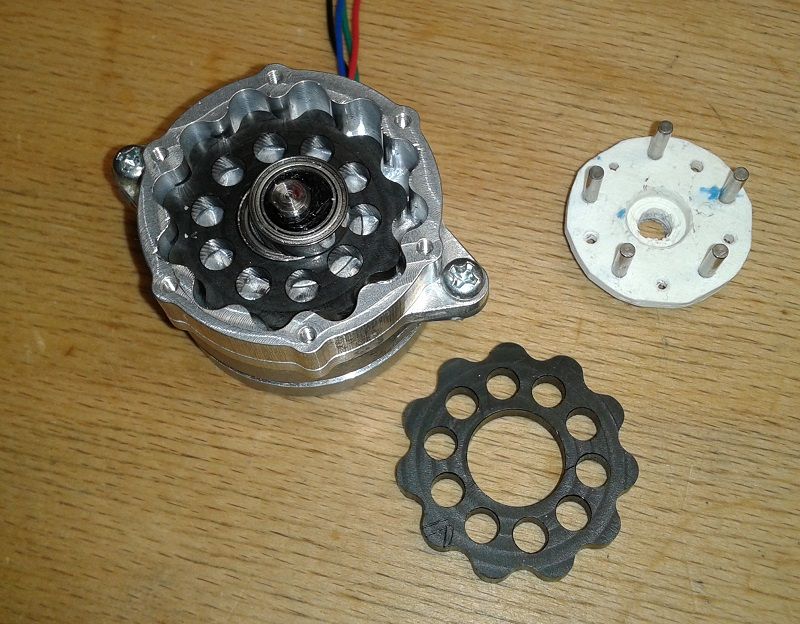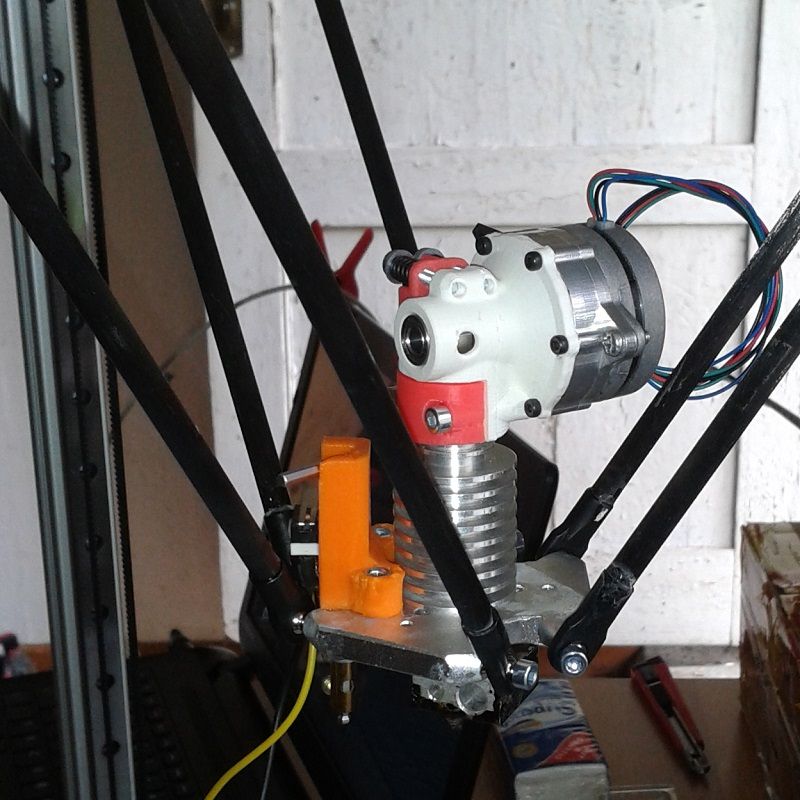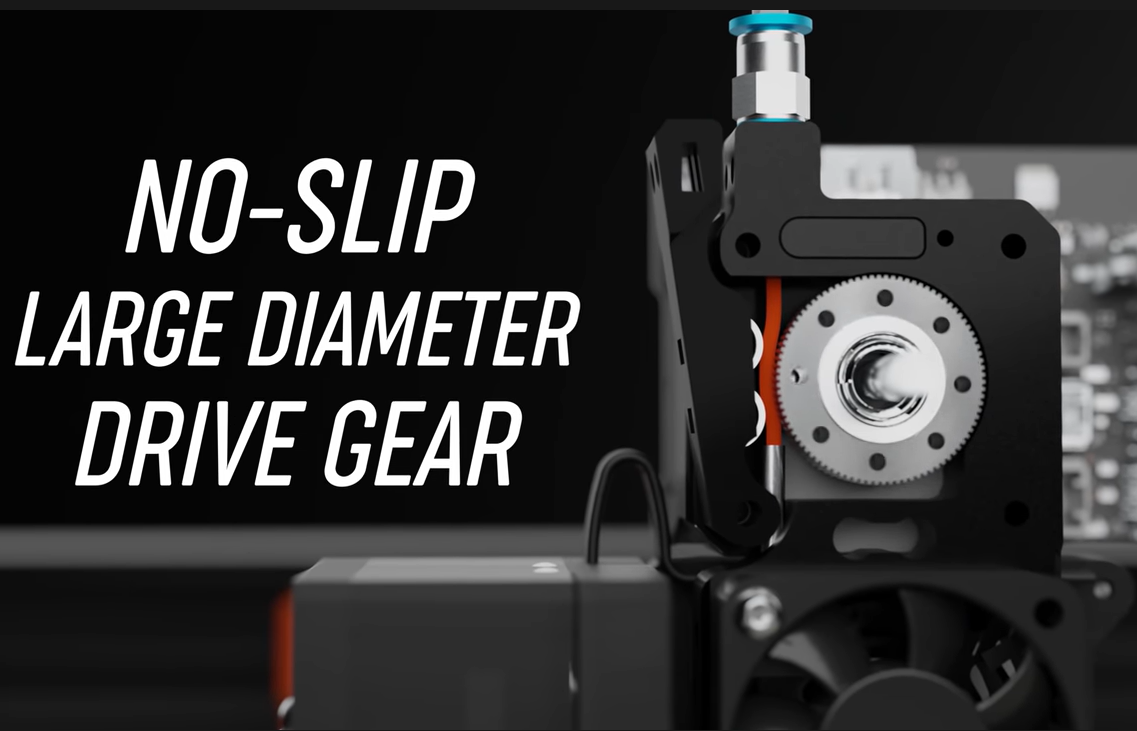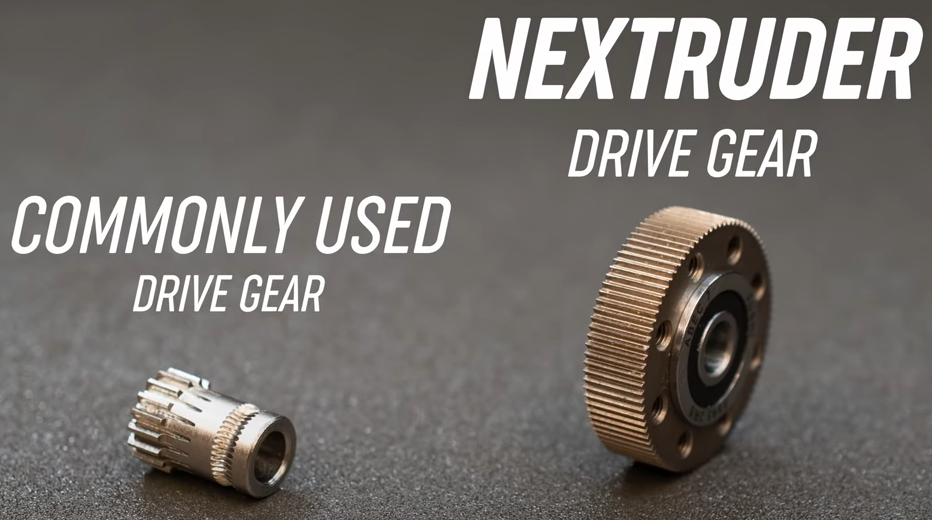Prusa new kitchen sink XL printer
-
@zapta
I'm proud to hear their Nextruder uses a Cycloidal drive gear. We've played with it in 2016 already:
Just wondering, what the non-slip drive gear looks like?


-
@o_lampe said in Prusa new kitchen sink XL printer:
@zapta
> I'm proud to hear their Nextruder uses a Cycloidal drive gear. We've played with it in 2016 already:
Just wondering, what the non-slip drive gear looks like?The no-slip gear is just one relatively large driven toothed gear pushing up against two bearings as far as i understood:


-
@exerqtor
That's clever! They seem to have integrated the cycloidal drive into the drive gear. At least the dowel pins it seems... -
Besides the cycloidal geard extruder, the filament path looks like pain in the arse to fiddle the filament in
 .
.
An as an mechanical engineer i am not a huge fan of unsupported beams of aluminum hanging in mid air trying to hold up the linear rails and hole printheadassebly.
But ohterwise i am curios to see what else prusa will bring to the table with this printer. Looks like an interesting design of the docking for the tools. -
Well the "beams" are supported more or less up until halfway out, and were not talking any significant load anyways. After all it's just a little 3D printer not a gantry crane

-
@exerqtor I'm wondering how well that filament path is going to handle flexible filaments. I can see getting a wad stuck between the 2 bearings opposing the toothed gear.
-
@mikebridge I agree, I would have thought a Bondtech (or Hemera) style dual drive arrangement would have better grip on a wide range of filaments.
-
@dc42
Prusa couldn't invent a dual drive extruder, since it's already there. They had to do something different -
This printer reminds me of concept cars. More a demonstration of ideas and capabilities rather than a solid and practical design for mass production. Will see next year how it will end up.
-
@o_lampe said in Prusa new kitchen sink XL printer:
They had to do something different
@zapta said in Prusa new kitchen sink XL printer:
This printer reminds me of concept cars.
The heatsink with inbuild load cell falls in the same category. Strain gauge and Piezo sensors were already there, something different had to be made...
-
I don't get the multi zone heated bed. I suppose having smaller "pads" with expansion joints in between would prevent warping due to thermal expansion, but using a kinematic mount is a lot simpler. Then how are the individual pads heated? Presumably each one has its own heater and so each one would need its own temperature sensor. That's a lot of sensors, MOSFETS, and wiring. The build surface would need to be thermally conductive which means that heat will conduct up into the build surface where there are heaters, but equally, heat will conduct down from the build surface where there are no heaters. It seems like a lot of complexity for very little gain.
And if you going to charge circa 3k for a machine, why not build the thing properly instead of using firmware to calibrate out all the build and design flaws?
-
@deckingman said in Prusa new kitchen sink XL printer:
I don't get the multi zone heated bed
Green washing?
Hobbyists, printing tug boats, spiral vases, x-mas ornaments or other useless stuff might feel better with a printer using less energy.
(I count myself in. The only useful? stuff I print are parts for new printers)//edit Sorry, I'm in foul mood lately...Winter is coming
-
i guess prusa learned from their mistake with the dual drive gear . Its causing more issues then its supposed to solve .
I agree that 2 idler wheels will probably cause issues with flexible filaments , maybe there is something i don't see , don't know . -
The multi zone heater system with expansion joints is a big question mark for me as well. I don't quite get the expansion joint theory .... isn't the bed a single piece? How does the expansion joint on the heater help to get a stable bed? Seems to me you would still need a kinematic mount for the bed or else live with the results of expansion of the build surface.
How do individual heaters help if the bed is a big heat conductor unless it is fairly thin?
I can understand multiple heaters on a giant build surface but we are not talking 'giant' here.
Many questions ... -
@jens55 Methinks it's just a marketing ploy. It'll likely be trumpeted as an innovation but that doesn't mean it's of any use. Just like sensor less homing. The real reason for that is to save Prusa the cost of a switch and an bit of wire on all their machines. The fact that it will never be as reliable or repeatable as a simple switch is irrelevant. To many people, the very fact that Prusa uses it must mean it's the dog's danglies.
-
Lacks a 3 post leveling. A pretty basic feature.
-
3dprintingnerd has a video on YouTube that shows the bed a bit better. It's basically individual pcb heaters with their own thermistors hooked up to a central "hub" that's under the bed. It also allowed things like segmented heating, hotspot measurement and compensation and heating only specific areas of the bed.
It's a pretty neat concept, albeit a complex one.
-
@roiki11 Too complex if you ask me. Imagine having to troubleshoot and maintain 16 heaters and thermistors. It's also 16 potential fire sources. They should have gone with max 4.
-
@techni said in Prusa new kitchen sink XL printer:
@roiki11 Too complex if you ask me. Imagine having to troubleshoot and maintain 16 heaters and thermistors.
Well, at least they didn't include a per segment independent leveling.

Reminds me of this Unnecessary Invention https://youtu.be/NvyMAfeoDOs?t=268
-
@o_lampe said in Prusa new kitchen sink XL printer:
The heatsink with inbuild load cell falls in the same category. Strain gauge and Piezo sensors were already there, something different had to be made...
A load cell is a device based on a strain gauge, isn't it? I'm not sure that a strain gauge can be used without mounting it onto a load cell of some sort...